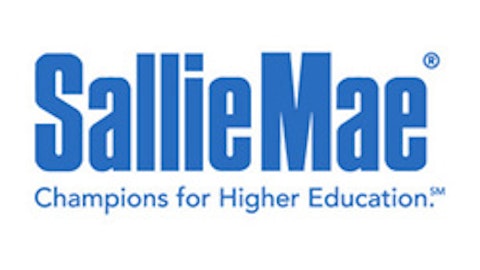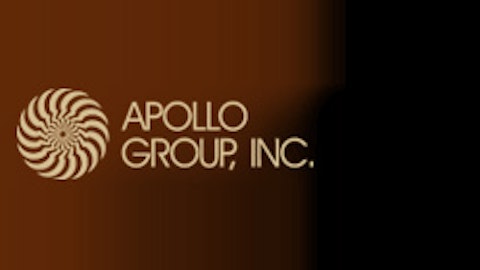The for-profit US education sector is a lesser favorite among investors, given the current decline in student enrollments, high student loan balances and negative publicity regarding government funding. However, this sector posted strong results prior to the recession and I am of the opinion that in the long run, as the economy picks up and the unemployment rate goes down, this sector will prove to be a good turnaround investment.

On March 25, one of the top colleges in this sector, Apollo Group Inc (NASDAQ:APOL), parent company of the University of Phoenix, reported its 2Q13 results. Its results clearly demonstrate the ongoing turmoil in the sector. Below I present key highlights of Apollo’s 2Q13 results and my take on whether or not you should invest.
Key highlights of Apollo’s results
Apollo Group Inc (NASDAQ:APOL) topped analyst’s estimates but still posted a 13% decline in its sales of $834.3 million, vs. analyst expectation of $824.7 million. Further 2Q13 net income dropped 78% to $0.12, vs. $0.51 last year. Excluding one-time items, net income was $0.34. Its disappointing results are mainly due to the downtrend in its enrollments. Its total enrollments fell 15% y-o-y to 300,800 and new enrollments dropped 20% to 38,900.
Restructuring
Given the decline in its enrollment and revenue, Apollo Group Inc (NASDAQ:APOL) has been aggressive on reducing its costs in order to protect its profitability. At its earnings call it increased its target savings by $50 million and expects a minimum $350 million savings by FY14, achieving 3/4 of the target in FY13.
In October 2012, it mentioned that it would cut 800 jobs and close 115 locations. Year to date, it has cut about 1,000 jobs and carried out 25% of its planned campus closures. It expects to complete the majority of its closures in 3Q13 and expects FY13 restructuring charges of $200 million.
Government scrutiny
This situation has affected most of the colleges within the for-profit education space. According to the US Department of Education, the default rate for the first three years that students are required to make payments is 13.4%, and for-profit colleges have reported even worse results. As a result, the Department of Education placed restrictions on government funding for schools/colleges whose students are not able to find suitable employment and are not able to pay their loans. Further, the current employment scenario is not providing any relief to the situation.
Now coming to Apollo Group Inc (NASDAQ:APOL); in 2008, University of Phoenix received the highest student financial aid funds of nearly $2.48 billion. In 2010, it came under government scrutiny after it was found that it had been engaging in deceptive enrollment practices and fraudulent solicitation of funds. The report issued by the Department of Education accused many for-profits of manipulating their default rates and mentioned that General Revenue Corp, a subsidiary of SLM Corp (NASDAQ:SLM), provided counsel on how to keep default rates down–and Apollo was one of its clients. However, Apollo and SLM both denied this and mentioned that loan forbearance was always a last resort.
More recently, University of Phoenix’s accreditation was put on probation by a review team from its accreditor, the Higher Learning Commission. The reason mentioned was that it failed to meet one or more of the commission’s criteria for accreditation. Given that Apollo’s sign-ups have fallen by 43% since 2010, this spells trouble as it targets a return to growth in its sign-ups by 2H13.
I agree the situation in Apollo looks pretty grim, but like every coin there is another side as well.
Sound business model
Companies in this sector have a very sound business model. Normally, these companies have gross margins ranging from 60-90%, strong balance sheets and lower capital requirements. Revenues mainly come from tuition or program fees, and a large amount of the costs are related to instructors’ fees. As it grows in size, it can gain on operational efficiencies and lower its fixed costs, and during downside, it can reduce its instructor numbers to lower its costs. Further, it doesn’t need huge capital requirements as most of its buildings are taken on lease and the majority of the for-profit colleges have strong cash balances and low debt.
Coming to Apollo Group Inc (NASDAQ:APOL), it is the largest among its peers in terms of revenue and also has posted strong and stable margins. Given the recent decline in revenues, it has been following a stringent cost-reduction plan (as explained above). As of 2Q13, Apollo has $821 million in cash and $91 million in debt. Further, cash flows are mainly used for capital expenditure and share buybacks. With such high cash balances, there may be a possibility for future dividend payout policies.
Future outlook
Currently, the sector is experiencing a downtrend with declining student enrollments, government scrutiny and high cost structure. However, in the long run, economic improvement and growing student enrollments will help to revive profitability in this sector. Further growth in employment rates and the resultant reduction in student loan balances will help to remove the negative publicity from these organizations.
Many colleges are also trying to improve their course offerings in an attempt to combat the increasing risk from online courses and tutors. Apollo plans to launch new career-oriented programs and is expanding partnerships with corporate customers.
Competitors
Apollo Group Inc (NASDAQ:APOL) is lagging behind its competitors with respect to its recent results. DeVry Inc. (NYSE:DV) posted a 3.6% decline in its 2Q13 revenues but showed growth in its student enrollments. Strayer Education Inc (NASDAQ:STRA) also posted a 9% decline in its 4Q12 revenues. But, in comparison with Apollo, it posted a much lower decline of 5% in both total enrollment and new enrollment numbers.
Conclusion
As mentioned earlier, this sector is poised for growth in the long run. Further, given a strong business model and solid balance sheet, companies in this sector are good turnaround investments.
Apollo, like its peers, is facing difficult circumstances, but the decline in Apollo seems to be more profound. If you already own the stock, hold it for the long run. If you are just entering the education space, I would suggest DeVry or Strayer as better options.
The article This Education Company Is Clearly Smart Despite Trouble originally appeared on Fool.com and is written by Sujata Dutta.
Copyright © 1995 – 2013 The Motley Fool, LLC. All rights reserved. The Motley Fool has a disclosure policy.



